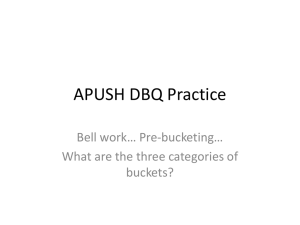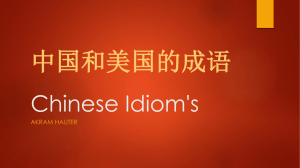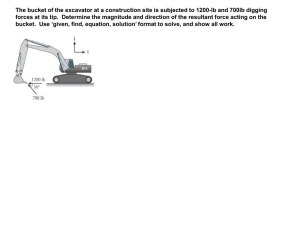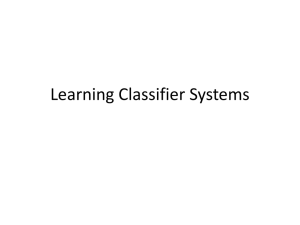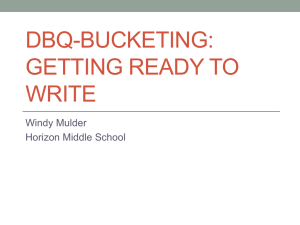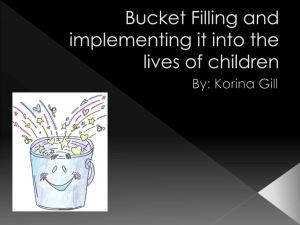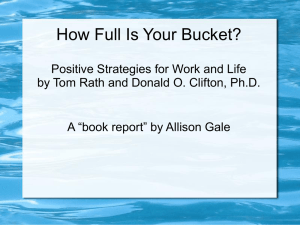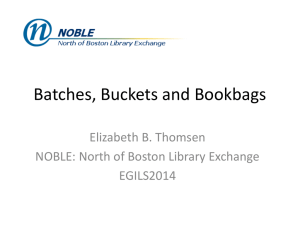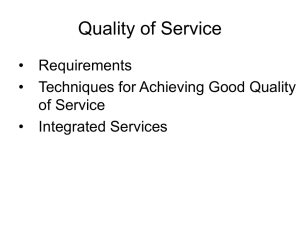Positive Strategies for Work and Life: How Full is Your Bucket?
advertisement
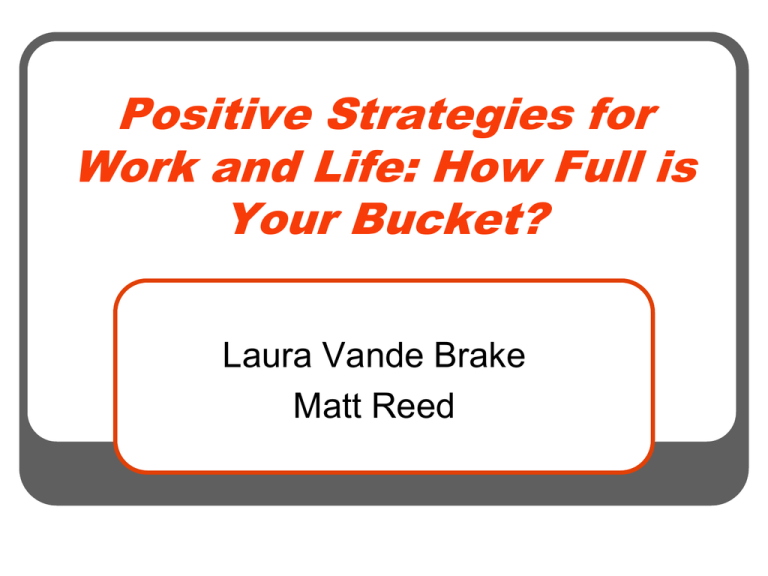
Positive Strategies for Work and Life: How Full is Your Bucket? Laura Vande Brake Matt Reed The Theory The Theory of the Dipper and Bucket • Pretend for a moment that we each have an imaginary dipper. When we inspire a positive interaction with other people, we are using our dipper to fill their buckets. When we fill other people’s buckets, we also fill our own. When we instigate a negative interaction with other people, we are using our dipper to empty their buckets. When we use that dipper to empty other’s buckets, we also emptying our own bucket. So Why is a Bucket Important? The bucket is where we store our energy and our self-worth When our bucket is full, we feel great When our bucket is empty, we feel awful The Bad News First: Negativity: the consequence of an empty bucket Negativity is unhealthy Negativity is expensive Unhealthy? High Blood pressure possibly leading to heart disease or a stroke High Stress situations which can lead to more serious mental and physical health problems Expensive? “Actively Disengaged” employees cost the United States between $250 and $300 billion per year in lost productivity, not to mention costs with turnover, injury, absences, and fraud. It would be cheaper to pay some people to stay home. Killing Productivity “The #1 reason people leave their jobs: They don’t feel appreciated” (p. 30). “Bad bosses could increase the risk of stroke by 33%” (p. 32). “A study found that negative employees can scare off every customer they speak with – for good” (p. 38). “65% of Americans received no recognition in the workplace last year” (p. 40). Now for the Good News: Positivity: the consequence of a full bucket (The tools to make a difference) Positivity is healthy Positivity is inexpensive Healthy? Optimism early in life predicted good health later in life. Positivity: The secret weapon Energize your employees rather than “checking in” on them. “…Bucket filling is an extraordinarily powerful leadership strategy…” (p. 29). Inexpensive? Expressing oneself in a positive manner is relatively inexpensive. • Use words, a smile, or a note Positivity increases productivity in individuals and organizations. Positivity increases engagement among colleagues. Positivity decreases employee turnover Free opportunities presented each day! Taking Every Moment! “…We experience literally hundreds of potential turning points in a given day…” (p. 43). “We experience approximately 20,000 individual moments in a waking day.” (p. 53) How many of those moments do you remember? What about Your Moments? What do you focus on when you are talking with people? Is it good? Is it bad? “Ninety-nine out of every 100 people report that they want to be around more positive people, 9 out of 10 report being more productive when they are around positive people” (p. 47). The Magic Ratio: (5:1) Five positive interaction to every one negative interaction is ideal. (3:1) Significantly increases productivity (13:1) The upper limit – there is such a thing as being too positive… It’s important to not ignore negativity and weakness. “Positivity must be grounded in reality” (p. 57) Make it Real! Be an expert at bucket-filling People are most grateful for recognition when it is personal, detailed, and welldeserved Just as each person is unique, so must you be unique when you his or her bucket Make it Personal Don’t! Use a one-size-fits-all approach Use recognition that seems forced or false Do! Know the individual personally Be genuine, let it come from the heart The lesson is clear: If you want people to understand that you value their contributions and that they are important, the recognition and praise you provide must have meaning that is specific to each individual. Not only is individualized bucket filling more effective in boosting productivity in the workplace, it builds sustainable relationships and changes people’s lives forever (p. 84). Fill Your Bucket Identify those individuals who fill your bucket. • What do they believe about you? • What do you also need to believe about yourself? Identify when you dip from your own bucket. • What do you tell yourself that is not true? • “Why bother” • “It doesn’t matter” • “No one will notice anyway” Change Your Life You can measure the positivity in your work/behaviors/actions by your level of self-love. “How much you love yourself and how you feel about yourself is directly proportionate to the quality and integrity of your word” (Ruiz, 2003, p. 23-24). The 5 Strategies Prevent Bucket Dipping • “Try to catch yourself bucket dipping – then stop it” (p. 87). Shine a Light on what is Right • “Every interaction gives you an opportunity to shine a light on what is right” (p. 91). Make Best Friends • “Great relationships lead to a significant increase in life satisfaction” (p. 96). The 5 Strategies (Continued) Give Unexpectedly • “A gift doesn’t have to be anything big to be successful” (p. 100). Reverse the Golden Rule • “Do unto others as they would have you do unto them” (p. 103). Resources: Clifton, D. O. & Rath, T. (2004). How full is your bucket? New York, NY: Gallup Press. Ruiz, D. M. (2003). Wisdom from the four agreements. White Plains, NY: Peter Pauper Press, Inc. Activity Let’s fill some buckets!!!
